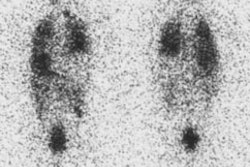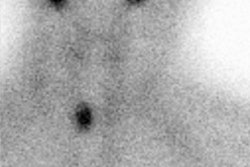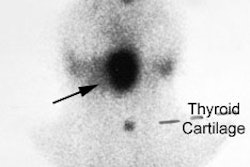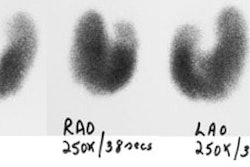Cancer 2002 Aug 1;95(3):488-98
Follicular thyroid carcinoma: prognostic factors and the role of radioiodine.
Chow SM, Law SC, Mendenhall WM, Au SK, Yau S, Yuen KT, Law CC, Lau WH.
BACKGROUND: The objective of this study was to investigate the patterns of
recurrence, various prognostic factors, and the role of radioiodine in the
treatment of patients with follicular thyroid carcinoma (FTC). METHODS: The
clinical outcomes of 215 patients with FTC who were treated at a single
institution were analyzed retrospectively. The mean follow-up was 10.8 years.
RESULTS: The actuarial rates of cause specific survival (CSS), locoregional (LR)
control, and freedom from distant metastasis (DM) at 10 years were 81%, 83%, and
72.3%, respectively. The independent prognostic factors for survival were
metastasis at presentation (relative risk [RR], 47.7), radioiodine (RAI)
treatment (RR, 0.25), extrathyroidal extension (RR, 3.8), and the postoperative
absence of macroscopic disease in the neck region (RR, 0.06). In patients who
were treated with RAI, both the LR failure rate (RR, 0.24) and the mortality
rate (RR, 0.25) were reduced to about 25%. Subgroup analysis revealed that RAI
improved the survival of patients with DM at presentation (RR, 0.17) and
improved the LR control rate in patients who had no DM at presentation (RR,
0.13). For patients who underwent total thyroidectomy with negative resection
margins, RAI significantly reduced the rate of LR recurrence (RR, 0.05).
Patients with the minimally invasive type of FTC had a good prognosis. The
10-year rates for CSS, LR control, and freedom from DM were 97.6%, 100%, and
90.6%, respectively. The prognosis of patients with frankly invasive FTC was
much poorer. The 10-year rates for CSS, LR control, and freedom from DM were
66.7%, 100%, and 45%, respectively. CONCLUSIONS: RAI is an effective treatment
for patients with FTC. It was associated with improved survival rates and fewer
recurrences. Copyright 2002 American Cancer Society.



